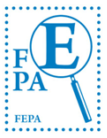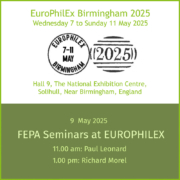FEPA Seminars at EuroPhilEx 2025
Two FEPA Seminars will be held at EuroPhilEx in the National Exhibition Centre, Birmingham, between 11.00am and 3.00pm on 9th May 2025, Meeting Room 3.
11.00am: Paul Leonard – Assisting Expert Committees through the use of forensic philately
Genuine or fraudulently manipulated? If an item is likely to have a high value, what reassurance can be given? The formation of an Expertising Committee in 1894 by instruction of the Philatelic Society of London Council (later the RPSL) aimed to provide such reassurance. Fundamentally, the committee members and helpers have access to reference material, and extensive knowledge of the subject matter such as rates and routes, that may often involve comparison with previously submitted items. Fraudulent manipulation such as the removal or addition of postmarks & overprints is a common challenge. Overpainting, re-gumming, repairing and fabrication of postal history are some of the topics on which submitters wish to ascertain a consensus. This may involve external consultants before the item is debated and a certificate issued as ‘Genuine’, ‘Genuine with caveats’ or ‘Bad’.
Helping the Expertising Committee there is a range of equipment which may help with analysis of spectra and measurement. Winner of the London Medal for work within the Expert Committee at the Royal Philatelic Society London, Paul Leonard BSc. (Hons), CSci., FRPSL will explore aspects of the history of expertising and his research work. This should include demonstrating the Foster Freeman Video Spectral Comparator (VSC 9000), thanks to support from the Foster Freeman Team. Web link: VSC9000 | Foster + Freeman
1.00pm: Richard Morel – How non-philatelic archives can be used to support philatelic research
Richard Morel is Curator of the British Library’s Philatelic Collections in London. After graduating from university he worked for the Royal Household; then spent a decade as an archivist for the India Office Records at the British Library. Through his extensive professional experience and knowledge, Richard is well placed to demonstrate how non-philatelic archival and library materials can be drawn upon to understand the context in which research in philately or postal history is being undertaken. He can also offer perspectives on how philatelic research can be drawn on to assist studies on other topics, a disciplinary interaction that has not always received the attention it deserves.
Richard’s presentation will begin with a brief introduction to the United Kingdom’s major archival resources as well as some of the major records series of philatelic significance housed within them. Through various case studies utilising books, maps, manuscripts and other materials, he will demonstrate how such widely neglected ‘non-philatelic’ resources actually provide valuable new insights and directions for philatelic and postal historical research. He then moves on to discuss how philately and postal history can also make significant contributions towards wider mainstream academic research. By situating philately and postal history at the centre of archives in this manner, Richard hopes the audience will begin to understand and appreciate how context philately has the potential to reinvigorate aspects of our philatelic world.
[credit: EuroPhilEx 2025 website]



